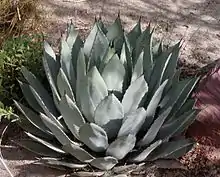| Agave palmeri | |
|---|---|
 | |
| Agave palmeri at Desert Demonstration Garden in Las Vegas | |
| Scientific classification | |
| Kingdom: | Plantae |
| Clade: | Tracheophytes |
| Clade: | Angiosperms |
| Clade: | Monocots |
| Order: | Asparagales |
| Family: | Asparagaceae |
| Subfamily: | Agavoideae |
| Genus: | Agave |
| Species: | A. palmeri |
| Binomial name | |
| Agave palmeri | |
Agave palmeri (also known as Palmer's century plant) is an especially large member of the genus Agave, in the family Asparagaceae.
Description
Agave palmeri is the largest Agave species growing in the United States. It produces a basal leaf rosette of fleshy, upright green leaves of up to 120 centimetres (4 feet) in length, with jagged edges and ending in sharp, thick spines of 3–6 cm (1+1⁄4–2+1⁄4 inches) long. The buds are purplish. Blooming from June to August,[2] the flowers are pale yellow and green; they are 4–5 cm (1+1⁄2–2 in) long with six segments and stamens,[2] growing on branches from the upper third of the flower spike, which can be up to 5 metres (16 ft) tall.[3][4][5]
Distribution and habitat
The plant is native to southern Arizona, southwestern New Mexico, Sonora and Chihuahua.[6][3][7] It can be found in dry, rocky areas.[2]
Cultivation
The plant is frequently cultivated as an ornamental in other regions.[8] It requires a large pot but is very tolerant of a wide range of conditions, including temperatures of around −10 °C.[9]
Uses
The plant was used by Native Americans for food, drink, fiber, soap, medicine and to make lances.[2]
References
- ↑ Salywon, A. (2019). "Agave palmeri". IUCN Red List of Threatened Species. 2019: e.T115689468A116354258. doi:10.2305/IUCN.UK.2019-3.RLTS.T115689468A116354258.en. Retrieved 19 November 2021.
- 1 2 3 4 Spellenberg, Richard (2001) [1979]. National Audubon Society Field Guide to North American Wildflowers: Western Region (rev ed.). Knopf. pp. 325–326. ISBN 978-0-375-40233-3.
- 1 2 Gentry, Howard Scott. Agaves of Continental North America. University of Arizona Press, Tucson, 1992.
- ↑ Flora of North America, Agave palmeri, v 26 p 460.
- ↑ Shreve, F. & I. L. Wiggins. 1964. Vegetation and Flora of the Sonoran Desert 2 vols. Stanford University Press, Stanford.
- ↑ Engelmann, Georg. Transactions of the Academy of Science of St. Louis 3: 319–320. 1875.
- ↑ Conabio (2009). Catálogo taxonómico de especies de México. 1. In Capital Nat. México. Conabio, Mexico D.F.
- ↑ Bailey, L.H. & E.Z. Bailey. 1976. Hortus Third i–xiv, 1–1290. MacMillan, New York.
- ↑ Complete Encyclopedia of Succulents by Zdenek Jezek and Libor Kunte
External links
 Media related to Agave palmeri at Wikimedia Commons
Media related to Agave palmeri at Wikimedia Commons
